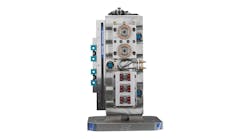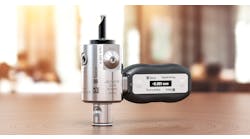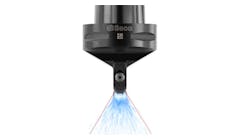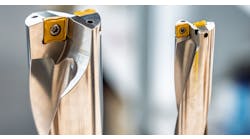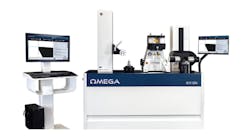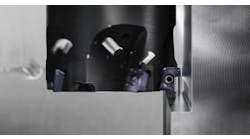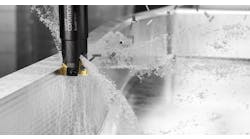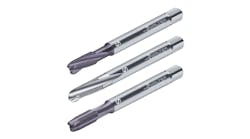The push for more productivity and lower costs is behind a drive for more advanced technologies in oil-and-gas drilling activities. Rock bits are an area of particular focus where new improvements can offer greater efficiency, reliability, and long operating life. Salvation Drilling Tools in San Bernardino, Calif. is developing a new approach for drill bit designs, engineered from the ground up to provide up to double the rate of penetration and life expectancy, improved bore circularity, and an end to downhole cone loss.
New rock bit design
Salvation Drilling Tools is focused now on a revolutionary new product: a reimagined and patented, three-cone rotary rock bit for oil-and-gas drilling with a completely reengineered design concept, a design that hasn’t changed in 90 years.
“Salvation’s all-new design is not an improvement on the old; it’s a radical departure from the industry standard,” claimed Gary Warwick, CEO of Salvation Drilling Tools. “We’ve introduced multiple innovations, including a one-piece, precision-machined body that provides truer geometry, greater strength, superior physical wear characteristics, and unmatched corrosion-resistance.”
That new design incorporates a fully machined assembly made with higher strength and more wear-resistant alloys that typically are not weldable. Removing the traditional welding points from previous three-cone bit designs eliminates key points of failure and results in a more precise rock bit that reduces run-out, minimizes the creation of out-of-round bores (which require redrilling) and can support both faster penetration and longer drill bit life.
Machining is paramount
With the new design, the Salvation Drilling Tools team recognized that manufacturing this assembly would present some new challenges, especially around the requirements for advanced machining.
Within the drill bit assembly there are seven complex components that need to be machined: the main bit body, machined from one piece of stainless aircraft alloy steel; three cones used to support the carbide cutting structure; and three legs that hold the rotary cutters. Machining these parts required new levels of precision and more efficient production to significantly reduce manufacturing costs.
Salvation had been working with Stellar Industrial Supply Company, a Sandvik Coromant distributor, as production of the new bit began ramping up. Recognizing the need for an integrated solution, Stellar introduced Sandvik Coromant to the Salvation team for further collaboration.
Sandvik Coromant provided additional engineering expertise and tooling recommendations to streamline their manufacturing operations — especially around the machining.
Using a one-and-done approach
Initially, the Salvation team planned to produce the seven key components on different machines, moving parts from one machining center to the next, depending on the operation required. However, transferring components through multiple operations would be too costly and slow, requiring multiple machines and more labor and floor space. In addition, this presented a quality risk with each new part setup.
Leveraging its machining engineering expertise, Sandvik Coromant’s Customized Solutions team assessed the components and the production plans and recommended a major change in the approach — one that would be more efficient and provide both higher accuracy per part as well as lower costs.
The Coromant team recommended that Salvation use a “one-and-done” machining technique, going from raw stock to finished product on a single machine.
Collaborative process development
The Coromant team engineered the new machining solution at its Sandvik Coromant Center, a state-of-the-art training, testing and R&D facility located at corporate headquarters in Mebane, N.C. Part of a global network of interconnected tech centers, the facility is equipped with the same machines that customers use so they can do their testing onsite, with access to Coromant experts across all areas of machining. In addition, Sandvik Coromant offers capabilities such as digital live machining for remote testing and monitoring.
For this approach, Sandvik Coromant employed its newest and most sophisticated tool at the tech center — a Mazak Integrex i-450 H with main and sub spindles for turning, milling, and five-axis machining. The Coromant team developed a new process for holding and machining Salvation’s components to reduce cycle time, complexity, and cost. The goal was to help Salvation establish a total production rate of 50 rock bit assemblies per day.
To reach that build rate with the most effective production quality and cost basis, the Sandvik Coromant solution included:
Vericut state-of-the-art simulation software, which enabled Salvation Drilling Tools to optimize its machining processes, reducing errors and ensuring the highest level of quality and accuracy in its products.
Mastercam computer-aided manufacturing (CAM) software, to streamline the manufacturing workflow, resulting in more efficient operations and reduced complexity.
Advanced machining and cutting tool technology, which provided the metal-cutting precision and efficiency needed to improve product quality and reduce production time.
Sandvik Coromant also worked in conjunction with Mazak’s Western Technology Center in Torrance, Calif., to develop the machining process for the rock bit’s cones. This additional collaboration helped expedite the testing and verifications for all the major components that required machining.
The result was a complete machining recommendation, built around the one-and-done approach, that included tool selection, cutting data, fixture design, process development, full NC coding and verification, and runoff support.
High quality and more productivity
Tolerances for Salvation’s rock bit components are extremely tight for the oil-and-gas industry — the majority are +/-0.0002 inch in variation. By eliminating the need for multiple transfers and setup, the one-and-done machining approach made it easier to hit that mark.
“As much as I was impressed by the one-and-done approach, I was equally impressed with the quality and performance of Sandvik Coromant’s cutting tool technology,” Warwick said. “For example, their API (American Petroleum Institute) laydown threading tool was especially impressive, cutting buttery smooth in-spec threads that required no deburring or further work. The lead-ins and lead-outs, which typically require attention after machining, were also perfect on the first attempt.”
The new recommendations also solved critical productivity goals. The average amount of part handling and work-holding per component was reduced by 50 percent. This eliminated several fixtures and machining operations, enabling Salvation to reduce production costs by a minimum of 30 percent, providing a more competitive edge in the oil-and-gas drilling industry.
The single-piece flow means less risk of scrapping and lower cycle times, as well as significant reductions in part reworking for better overall part quality and dramatically higher production rates. Salvation is targeting five quality assemblies per cell every 24 hours, with 50 assemblies per day produced across 10 cells to satisfy market demand.
Partnership for manufacturing excellence
The collaboration and innovation between Salvation Drilling Tools and Sandvik Coromant demonstrate the power of partnership in achieving manufacturing excellence. By harnessing the latest machining technology and software solutions and the expertise of both teams, Salvation Drilling Tools is transforming its production processes to match the game-changing innovation engineered into the new three-cone rotary rock bit.
“With Sandvik Coromant’s invaluable help, the quality of our product is assured,” said Warwick. “We not only anticipate savings in labor and fixture costs but expect greater flexibility in production and faster build time, paving the way for a more competitive and sustainable future in the oil-and-gas drilling industry.”
Derek Smith is a senior CAM and application engineer with Sandvik Coromant.
